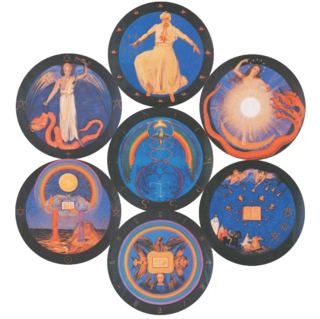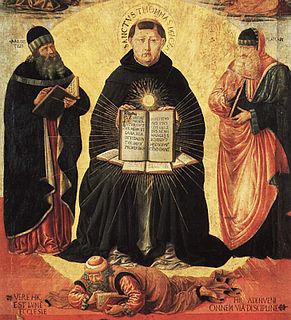
Anthroposophy is a philosophy founded by the 19th century esotericist Rudolf Steiner that postulates the existence of an objective, intellectually comprehensible spiritual world, accessible to human experience. Followers of anthroposophy aim to develop mental faculties of spiritual discovery through a mode of thought independent of sensory experience. They also aim to present their ideas in a manner verifiable by rational discourse and specifically seek a precision and clarity in studying the spiritual world mirroring that obtained by natural historians in investigations of the physical world.

Pentecostalism or Classical Pentecostalism is a renewal movement within Protestant Christianity that places special emphasis on a direct personal experience of God through baptism with the Holy Spirit. The term Pentecostal is derived from Pentecost, the Greek name for the Jewish Feast of Weeks. For Christians, this event commemorates the descent of the Holy Spirit upon the followers of Jesus Christ, as described in the second chapter of the Acts of the Apostles.

Rudolf Joseph Lorenz Steiner was an Austrian philosopher, social reformer, architect, and esotericist. Steiner gained initial recognition at the end of the nineteenth century as a literary critic and published philosophical works including The Philosophy of Freedom. At the beginning of the twentieth century he founded an esoteric spiritual movement, anthroposophy, with roots in German idealist philosophy and theosophy; other influences include Goethean science and Rosicrucianism.

The meaning of spirituality has developed and expanded over time, and various connotations can be found alongside each other.

A spiritual gift or charism is an endowment or extraordinary power given by the Holy Spirit. These are the supernatural graces which individual Christians need to fulfill the mission of the Church. In the narrowest sense, it is a theological term for the extraordinary graces given to individual Christians for the good of others and is distinguished from the graces given for personal sanctification, such as the Seven Gifts of the Holy Spirit and the fruit of the Holy Spirit.
Guru is a Sanskrit term for a "teacher, guide, expert, or master" of certain knowledge or field. In pan-Indian traditions, guru is more than a teacher, in Sanskrit guru means the one who dispels the darkness and takes towards light, traditionally a reverential figure to the student, with the guru serving as a "counselor, who helps mold values, shares experiential knowledge as much as literal knowledge, an exemplar in life, an inspirational source and who helps in the spiritual evolution of a student". A guru is also one's spiritual guide, who helps one to discover the same potentialities that the guru has already realized. In Indonesian and Malay the word means teacher.
Spirituals are generally Christian songs that were created by African Americans. Spirituals were originally an oral tradition that imparted Christian values while also describing the hardships of slavery. Although spirituals were originally unaccompanied monophonic (unison) songs, they are best known today in harmonized choral arrangements. This historic group of uniquely American songs is now recognized as a distinct genre of music.

The Syriac Orthodox Church of Antioch, or Syriac Orthodox Patriarchate of Antioch and All the East, is an Oriental Orthodox Church with autocephalous patriarchate established by Severus of Antioch in Antioch in 518, tracing its founding to Antioch by Saint Peter and Saint Paul in the 1st century as described in the Acts of the Apostles, and according to its tradition. It was then restructured by Severus of Antioch in Antioch in 518. The Church uses the Divine Liturgy of Saint James, associated with St. James, the "brother" of Jesus and patriarch among the Jewish Christians at Jerusalem. Syriac is the official and liturgical language of the Church based on Syriac Christianity. The primate of the church is the Syriac Orthodox Patriarch of Antioch currently H.H. Ignatius Aphrem II since 2014, seated in Cathedral of Saint George, Bab Tuma, Damascus, Syria.

Traditionally, an ashram-Hindi is a spiritual hermitage or a monastery in Indian religions.

Eckankar is a new religious movement founded by Paul Twitchell in 1965. It is a non-profit religious group with members in over one hundred countries. The spiritual home is the Temple of Eck in Chanhassen, Minnesota. Eckankar is not affiliated with any other religious group.
The Brahma sūtras is a Sanskrit text, attributed to Badarayana, estimated to have been completed in its surviving form some time between 450 BCE and 200 CE. The text systematizes and summarizes the philosophical and spiritual ideas in the Upanishads. It is one of the foundational texts of the Vedānta school of Hindu philosophy.
The term "Spiritual Christianity" refers to "folk Protestants", non-Orthodox indigenous to the Russian Empire that emerged from among the Orthodox, and from the Bezpopovtsy Raskolniks. Origins may be due to Protestant movements imported to Russia by missionaries, mixed with folk traditions, resulting in tribes of believers collectively called sektanty (sects). When discovered, these tribes of heretics were typically documented by Russian Orthodox Church clergy with a label that described the heresy – not fasting, meeting on Saturday, rejecting the spirit, genital and breast mutilation, self-flagellation, etc.
A spiritual successor, sometimes called a spiritual sequel, is a successor to a work of fiction which does not build upon the storyline established by a previous work as do most traditional prequels or sequels, yet features many of the same elements, themes, and styles as its source material, thereby resulting in it being related or similar "in spirit" to its predecessor.
Spiritual direction is the practice of being with people as they attempt to deepen their relationship with the divine, or to learn and grow in their own personal spirituality. The person seeking direction shares stories of his or her encounters of the divine, or how he or she is cultivating a life attuned to spiritual things. The director listens and asks questions to assist the directee in his or her process of reflection and spiritual growth. Spiritual direction advocates claim that it develops a deeper awareness with the spiritual aspect of being human, and that it is not psychotherapy, counseling, or financial planning.

Advanced Dungeons & Dragons: Treasure of Tarmin is a video game for the Intellivision video game console and the Mattel Aquarius computer system. This game was a licensed Dungeons & Dragons adaptation.

The Five Strengths in Buddhism are faith, energy, mindfulness, concentration, and wisdom. They are one of the seven sets of "qualities conducive to enlightenment." They are parallel facets of the five "spiritual faculties."

Lama is a title for a teacher of the Dharma in Tibetan Buddhism. The name is similar to the Sanskrit term guru and in use it is similar, but not identical to the western monastic rank of abbot.
Iddhipāda is a compound term composed of "power" or "potency" and "base," "basis" or "constituent" (pāda). In Buddhism, the "power" referred to by this compound term is a group of spiritual powers. Thus, this compound term is usually translated along the lines of "base of power" or "base of spiritual power." In the Buddhist pursuit of Enlightenment, the associated spiritual powers are secondary to the four "base" mental qualities that achieve such powers. These four base mental qualities are: concentration on intention; concentration on effort; concentration on consciousness; and, concentration on investigation. These four base mental qualities are used to develop wholesome mental states and rid oneself of unwholesome mental states.
"Spiritual but not religious" (SBNR), also known as "Spiritual but not affiliated" (SBNA), is a popular phrase and initialism used to self-identify a life stance of spirituality that takes issue with organized religion as the sole or most valuable means of furthering spiritual growth. Historically, the words religious and spiritual have been used synonymously to describe all the various aspects of the concept of religion, but in contemporary usage spirituality has often become associated with the interior life of the individual, placing an emphasis upon the well-being of the "mind-body-spirit", while religion refers to organizational or communal dimensions.











